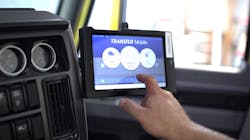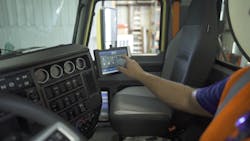The modern fleet challenge: Sustainability, immunity to disruptions, evolution
As anyone working in our industry well knows, the freight transportation business has suddenly found itself at a critical and challenging intersection.
Competition and expectations have never been higher for motor carriers, with the supply chain demanding quicker and more efficient workflow, resiliency in the face of massive shifts in consumerism and technology, and the pressing need to do all of this in an environmentally sustainable way. Oh, and don’t forget you still have to turn a profit.
Put another way—T.I.M.E. is of the essence: Timely service, Immunity to disruptions and evolution, meeting Monetary goals, and decreasing Environmental impact.
These four elements define what it means to operate a trucking company today, no matter the scale—a single-truck operator working a dedicated lane between Atlanta and Cincinnati or a multi-thousand power-unit fleet sprawling the lower 48.
The disruptions wrought by the COVID-19 pandemic and the continually roiled supply chain have shined a spotlight on the need for the industry to innovate and figure out what the next chapter of freight movement looks like.
The good news is, while the four pillars of T.I.M.E. present challenges, many of the tools and technologies to meet these challenges are already here, and carriers that rise to the occasion are best positioned to live to see tomorrow’s freight transportation industry. And in the meantime, they also can capitalize on the opportunities offered by becoming more efficient, utilizing technologies that move the industry forward, and of working within an ecosystem that connects the parties of the supply chain to create a cleaner, more resilient trucking industry. It’s simply a matter of adoption, integration, and awareness.
For example, what started as a mad scramble by motor carriers to meet the demands of shippers and receivers for contactless solutions at the docks in 2020 quickly became a point of competitive advantage, efficiency, and financial gain.
By taking freight documents like bills of lading and proofs of delivery into the digital realm—and removing the need to shuffle hard-copy paperwork from terminal, to driver, to shipper, to receiver, to factoring service, to back-office, and so on—carriers found they were able to process more loads, invoice their shipper and broker customers more quickly, and of course get paid faster and improve their cash flow.
At the same time, that trend streamlined these mundane workflow tasks for drivers and back-office personnel. What fleets found is that by eliminating or automating basic non-driving tasks, that provides drivers with a little more time behind the wheel each day.
Even gaining just five miles per day per driver, which may not sound like much at first blush, can allow a driver to earn about $1,400 more over the course of the year. And for a fleet with a few hundred trucks, that can add up to tens of thousands of extra miles a month.
Digital documents are just one example, but it addresses time-saving workflow tools, monetary gains for fleets, immunity to disruptions, and environmental benefits in reducing paper consumption.
These digital tools also give carriers the framework to integrate with their shipper and broker customers to create visibility into the transportation network as a whole. While that may sound intimidating, ask any shipper or broker about carrier integrations, and they’ll tell you it’s a fast-approaching requirement that carriers allow shippers to hook into their systems to create a truly digitized freight supply chain.
Integrated platforms that work between shippers and carriers, and the data sharing thereof, make the most efficient use of the U.S. trucking fleet and its available capacity, which reduces emissions and maximizes loaded miles. There again—benefits of time, immunity, monetary, and environmental.
This is the inescapable reality of today’s trucking landscape, and carriers that heed these changes truly will withstand the test of, well, T.I.M.E.
Doug Schrier leads Transflo’s carrier product and innovation team. He’s worked in the trucking industry for more than 15 years, including as a vice president at Covenant Transport, giving him first-hand, intimate knowledge of motor carrier operations and supply chain processes. Transflo, a Pegasus TransTech company, is a leading provider of mobile, telematics, and business process automation services to the transportation industry in the United States and Canada.
About the Author
Doug Schrier
SVP of strategy at Transflo
Doug Schrier leads Transflo’s carrier product and innovation team. He’s worked in the trucking industry for more than 15 years, including as a vice president at Covenant Transport, giving him first-hand, intimate knowledge of motor carrier operations and supply chain processes.
Transflo, a Pegasus TransTech company, is a leading provider of mobile, telematics, and business process automation services to the transportation industry in the United States and Canada.

